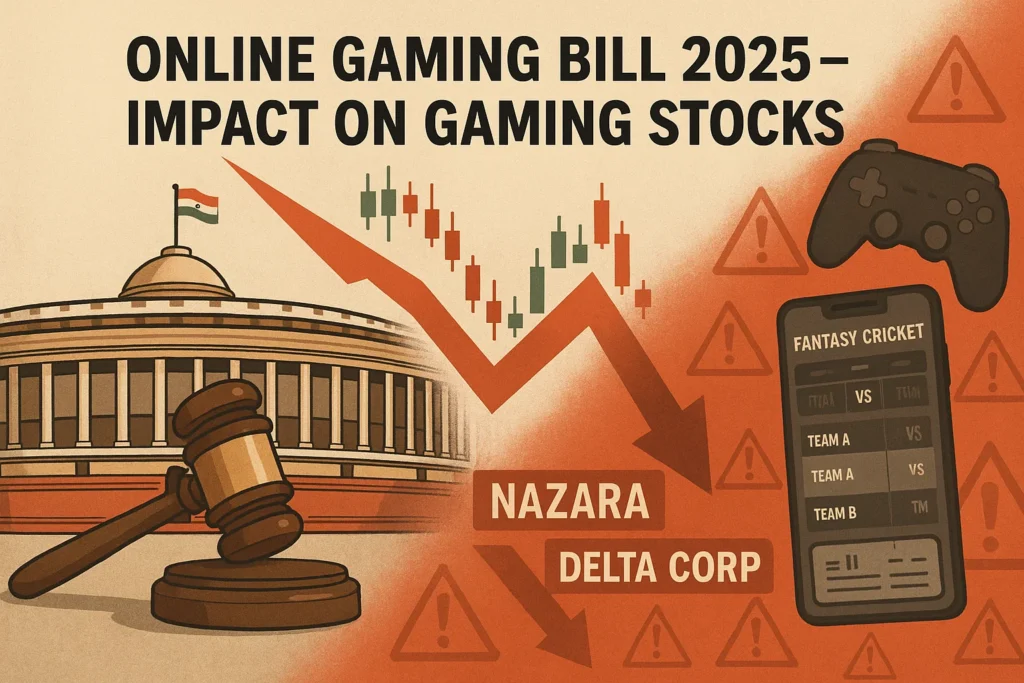India’s rapidly growing online gaming industry has just hit a major regulatory wall. The Union Cabinet has approved the Promotion & Regulation of Online Gaming Bill, 2025, which will be introduced in Parliament today. If passed, the law will outlaw all money-based online games, irrespective of whether they are skill-based or chance-based.
For stock market investors, this move has already rattled gaming stocks like Nazara Technologies and Delta Corp, raising questions about the future of the sector. Let’s break down the full story, why the government is pushing for such a law, how the industry is reacting, and most importantly—what it means for investors in gaming stocks.
What the Online Gaming Bill Proposes
The Bill represents the most sweeping crackdown yet on real-money online gaming. According to the draft provisions:
- All money-based games will be banned, whether skill-driven (like fantasy sports, rummy) or pure chance (like betting, lotteries).
- Advertisements promoting real-money platforms will be prohibited.
- Banks and payment gateways will not be allowed to process transactions linked to such games.
- Violators could face up to three years in jail and heavy fines.
- Only free-to-play games and subscription-based formats will be permitted, where users pay a fixed fee but cannot wager money during gameplay.
This is a crucial departure from the earlier regulatory stance, where courts had drawn a distinction between games of skill and games of chance. The new Bill, if passed, removes that line altogether.
Why the Government Is Taking This Step
The government’s rationale for the move rests on three pillars:
- Addiction and Social Risk: Online gaming has often been linked to rising cases of financial losses, especially among minors. The Education Ministry has already issued advisories to parents and teachers.
- Taxation Pressure: Since October 2023, the government has imposed a 28% GST on gaming revenues, while winnings from FY25 onwards are taxed at 30%. Offshore gaming operators have also been brought under the Indian tax net.
- Law Enforcement: With more than 1,400 illegal websites and apps blocked since 2022, the government sees prohibition as the only way to clean up the sector. Unauthorised betting has already been criminalised under the Bharatiya Nyaya Sanhita, with penalties of up to seven years in prison.
Taken together, these measures reflect a decisive shift from “tax and regulate” to “prohibit and enforce.”
How the Industry Is Responding
The decision has sparked strong pushback from the gaming industry. The All India Gaming Federation (AIGF) has written to Union Home Minister Amit Shah, warning that a blanket ban will:
- Push crores of legitimate players into the hands of illegal offshore operators.
- Inflict a death knell on a sector valued at nearly ₹2 lakh crore.
- Cause lakhs of job losses across e-sports, design, animation, and startups.
- Cut off significant tax revenues for the government.
Industry insiders argue that for over 70 years, Indian courts have recognised skill-based games as distinct from gambling. They fear that the Bill, in its current form, will not only hurt innovation but also violate constitutional rights such as Article 19(1)(g) (right to carry on trade) and Article 14 (right to equality).
Beyond legality, the industry warns of severe economic fallout. The online gaming ecosystem supports over one lakh jobs, attracts significant foreign investment, and contributes more than ₹25,000 crore annually in taxes.
Market Impact: Gaming Stocks Under Pressure
The stock market reacted swiftly to the news of Cabinet approval.
📉 Nazara Technologies (NSE: NAZARA)
- Shares slid nearly 7% intraday as investors worried about regulatory headwinds.
- Although Nazara has no direct exposure to real-money gaming, the sentiment-driven sell-off shows how sensitive gaming stocks are to regulatory news.
- The company’s main revenue comes from e-sports, gamified learning, and publishing, which may actually benefit if real-money rivals vanish.
📉 Delta Corp (NSE: DELTACORP)
- The casino operator’s stock opened 5% lower but later staged a recovery.
- Delta Corp has already faced heavy pressure from the 28% GST on casinos.
- A wider prohibition on betting could add to its challenges, keeping investor sentiment cautious.
Wider Ecosystem
Unlisted unicorns like Dream11, Games24x7, Winzo, GamesKraft, My11Circle, and KheloFantasy are now facing an existential crisis. While not directly investable, their troubles could influence sentiment across the broader digital economy, especially in tech and entertainment sectors.
What Investors Should Watch Next
For investors tracking gaming stocks, a few critical points stand out:
- Parliament Debate Today: The Bill’s exact language will reveal whether the government opts for a total ban or leaves room for regulated skill-based games.
- Legal Challenges: Industry bodies are preparing for constitutional challenges, and courts may once again draw a distinction between skill and chance.
- Company Strategies: Listed firms like Nazara may pivot further toward e-sports and subscription-based models, while Delta will have to navigate casino-specific rules.
- Investor Sentiment: Regulatory overhang could create short-term volatility not just in gaming stocks but also across digital-first businesses.
Investor Takeaway
The Online Gaming Bill 2025 is not just a story about one sector—it’s a test case for how India will regulate its digital economy in the years ahead.
- Short-term: Expect volatility in gaming stocks like Nazara Technologies and Delta Corp.
- Medium-term: Industry pushback and possible court challenges could slow or alter the final law.
- Long-term: If prohibition holds, India’s gaming sector will shrink sharply, but e-sports and subscription models may emerge as safe havens.
For now, investors should stay cautious, avoid speculative bets, and watch how the Bill evolves in Parliament. With regulatory clarity still pending, gaming stocks will remain under the market’s spotlight.
More Articles
5 Unique & Underrated Business Model Stocks in India You Shouldn’t Ignore
Luxury Housing Boom: Real Estate Stocks to Watch in 2025
Golden Crossover vs Death Crossover: How to Use These Powerful Chart Signals




